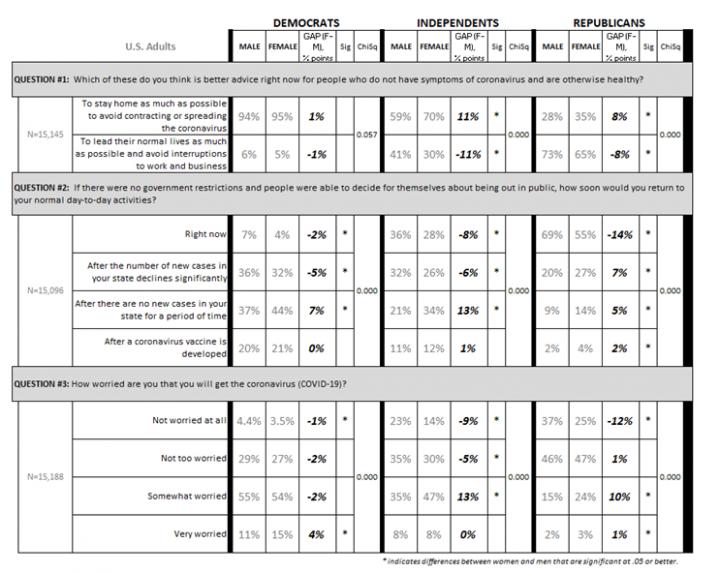Implications for workplace reopenings and 2020 election

Credit: Table provided by Deborah Jordan Brooks and Lydia Saad.
A Dartmouth-Gallup study finds that women are more concerned about COVID-19 than men, a difference that transcends party lines. This female perspective towards the pandemic may be overlooked due to the underrepresentation of women in the workplace that is compounded by an underrepresentation in politics, creating what the researchers refer to as a representational “double whammy” effect. The study’s findings are published in Politics & Gender.
“Men are less likely to favor precautions for COVID-19 than women, basically across the board,” said co-author Deborah Jordan Brooks, an associate professor of government at Dartmouth. “We find that substantial differences exist among male and female Republicans, Independents, and Democrats, and among workplace leaders and rank-and-file workers.”
Brooks adds, “The positioning of many high-profile Republicans, including President Trump, regarding a minimal need for precautions regarding COVID-19 does not match up with the substantially more cautious COVID-related preferences of women. In light of President Trump’s recent COVID-19 diagnosis and its spread throughout White House staff, our findings imply that the heightened focus on the coronavirus in the final weeks of the campaign has the potential to put the Republican Party at a further disadvantage with female voters.”
The study was based on a nationally, representative online survey conducted by Gallup from May 18 to June 14, 2020 on questions relating to COVID-19 concerns, individual preferences and workplace structure. (Confirmatory results from more recent surveys on many of these measures will be posted by the co-authors on the Gallup website later today, Oct. 7). The researchers sought out to examine how views towards COVID-19 may vary by gender, as well as by partisanship and an individual’s role in the workplace (worker vs. workplace leader).
Women vs. Men on COVID-19 Overall
The results illustrate that women have a substantially greater concern for COVID-19 than men. One of the survey questions asked whether it was better advice for people without symptoms who are otherwise healthy to stay home as much as possible to avoid contracting or spreading the coronavirus, or lead normal lives as much as possible to avoid interruptions to work and business. The findings show that 28 percent of women thought it was better to lead normal lives versus staying at home, as compared to 40 percent of men.
When asked how soon respondents would return to normal day-to-day activities if there were no government restrictions, 37 percent of men at the time of the study answered “right now,” as compared to just 24 percent of women.
These findings that men perceive COVID-19 as less of a risk seem particularly notable in light of the fact that medical research indicates that men are significantly more likely to die from the coronavirus than women.
Gender Differences by Party
While Democrats tend to view COVID-19 as a greater public health risk than Republicans, and women are more likely to be Democrats than men, this study shows that the gender findings go well beyond that. The findings show that women are more concerned and cautious about COVID-19 than their male co-partisans regardless of the party in question.
For example, if there were no government restrictions on being out in public, 69 percent of Republican men would resume regular activities immediately, versus 55 percent of Republican women (the same is true for 36 percent of independent men and 28 percent of independent women, and 7 percent of Democratic men versus 4 percent of Democratic women). Similarly, 37 percent of Republican men reported being “not worried at all” about contracting the coronavirus, versus just 25 percent of Republican women, with significant differences observed for independents and Democrats, as well. (See Table at the end of this release).
Gender Differences Among Workers & Workplace Leaders
The results also show that female workers are more worried about contracting COVID-19 at work and are significantly more worried about returning to work safely due to the pandemic than male workers. Female workers also think that the COVID-19 disruption will last longer than a year and indicated that they would prefer to work remotely, if employers were to leave the decision up to them. As the co-authors state, “male workers are far more bullish about returning to work life as usual than are their female colleagues, and similarly-gender patterns exist among workplace leaders.”
The workplace in the U.S. may not reflect or even consider these distinct, female preferences towards COVID-19, since women are severely underrepresented at the highest leadership positions in healthcare, education and other fields. For example, the researchers point out how “only 3 percent of healthcare CEOs and medical divisions chiefs are women” while women account for 80 percent of healthcare workers.
Implications for Party Leadership
Brooks points out that the study’s findings on workplace decision-making and political preferences regarding the coronavirus might be more related than they initially appear. “Many female leaders in the Democratic Party, including Speaker of the U.S. House of Representatives Nancy Pelosi (D-CA), have been positioned front-and-center in Democratic policymaking around COVID-19. In contrast, like most high-prestige organizations today, the Republican Party has shockingly few women in its leadership pipeline. The intense focus on COVID-19 during this election – an issue with so many substantial gender differences – may be contributing to the staggeringly-wide gender gap in candidate preference that has been evident in recent poll results,” explained Brooks.
###
Brooks is available for comment at: [email protected]. The study was co-authored by Lydia Saad at Gallup.
Media Contact
Amy D. Olson
[email protected]
Original Source
https:/




